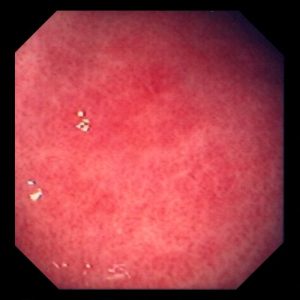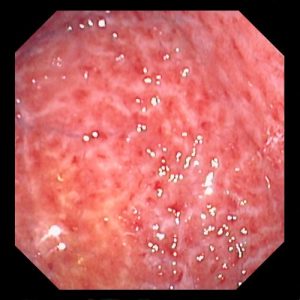 If you haven’t heard of gastritis, it is when inflammation occurs within the lining of the stomach. Common gastritis symptoms may include upper abdominal pain, nausea and indigestion. When acute or mild, gastritis is treatable and will go away. But if left untreated, it can develop into ulcers or even stomach cancer.
If you haven’t heard of gastritis, it is when inflammation occurs within the lining of the stomach. Common gastritis symptoms may include upper abdominal pain, nausea and indigestion. When acute or mild, gastritis is treatable and will go away. But if left untreated, it can develop into ulcers or even stomach cancer.
If we were to ever get into a car accident, the airbag would deploy to protect us. Even still, we may experience some bumps and bruising, but generally we have a much higher chance of survival with an airbag.
Advertisement
The concept of an airbag in a crash is similar to inflammation in the body. When something poses a threat to the body, such as an open wound created by a scrape from falling, inflammation is created to protect the body.
But inflammation can either protect the body or it can be caused by an infection, which may hinder the body – similar to injury caused by an airbag. The intent is good, but sometimes damage can still occur. But why are we discussing inflammation?
Well, as mentioned, inflammation can either be good or bad. In the case of inflammation in the stomach, it’s more commonly bad.
For better understanding of gastritis, let’s examine the causes, signs and symptoms, types and natural remedies for gastritis.
Types of gastritis
There are two main types of gastritis: acute and chronic.
Acute gastritis: Acute gastritis can cause pain and swelling in the stomach but generally does not last for a long period of time – it stops within a few days.

Photo Credit: merckmanuals.com
Chronic gastritis: Chronic gastritis is just that – chronic. This refers to it lasting for a long period of time. Someone may have chronic gastritis and not even realize it because symptoms are dull and not severe.

Photo Credit: merckmanuals.com
 What are the symptoms of gastritis?
What are the symptoms of gastritis?
Symptoms of gastritis – acute and chronic – are quite similar. Here are some symptoms of gastritis to pay attention to:
- Abdominal pain
- Vomiting
- Nausea
- Belching
- Weight loss/loss of appetite
- Indigestion
- Black stools
- Blood in stool
- Feeling full in the upper abdominal area post-eating
Related reading: Never ignore these stomach pains
What causes gastritis?
The main cause of gastritis is inflammation of the stomach lining. It is important to understand what can cause this inflammation.
Causes of acute gastritis
- Medications, such as anti-inflammatory drugs
- Bacterial infections
- Excessive alcohol consumption
- Viral infections
- Digestive illnesses, such as Crohn’s or Colitis
- Kidney failure
- Surgery
Causes of chronic gastritis
- Long-term use of medications
- Excessive alcohol consumption
- Bacterial infection
- Kidney failure
- Weakened immune system with a viral infection
- Bile reflux – where bile moves into the stomach
- Chronic severe stress
How to avoid gastritis
Gastritis can be quite painful, uncomfortable and lead to stomach cancer, so it’s important to find ways to avoid it altogether. When avoiding gastritis, it’s important to know your risk factors. Some risk factors of gastritis include:
- Those who use anti-inflammatory medications for a long period of time
- Those who drink excessively
- Those with liver, kidney or lung failure
- Those with digestive disease like Crohn’s
- Those who consume a diet high in acidity, as in citrus fruits
Diet can play a large role in avoiding gastritis. Knowing what foods to eat and which to avoid – especially if you have any of the gastritis risk factors – is important.
 Foods to avoid to prevent gastritis
Foods to avoid to prevent gastritis
Here is a list of foods you should avoid to prevent gastritis. These foods can irritate and aggravate the stomach, making a person more prone to gastritis:
- Alcohol
- Coffee and tea
- Whole milk (including chocolate)
- Citrus fruits and juices (oranges, lemons, limes, grapefruits)
- Peppers
- Garlic powder
- Highly spiced meats (sausage, bacon, salami)
- Tomato and tomato products
Foods to enjoy with gastritis
If you’ve already been diagnosed with gastritis, here are some foods which are safe to consume.
- Vegetables
- Poultry
- Whole grains
- Brown rice
- Beans
- Eggs
- Nuts
- Olive oil
Treatment of gastritis
Even though gastritis can be acute and go away on its own, there are treatment options to prevent it from worsening.
Some typical medical treatments of gastritis are:
- Medications to treat bacteria, if that is the cause
- Medications to block acid production
- Antacids to neutralize stomach acids
Although these are what the medical world suggests when treating gastritis, there are natural means which you can opt for as well.
Related reading: Do these 4 things at night for a healthier stomach
Natural home remedies for the treatment of gastritis
Advertisement
To treat gastritis naturally there are some lifestyle changes you can do.
- For starters, stop smoking and limit drinking.
- Avoid trigger foods and eat smaller meals more frequently to avoid indigestion.
- Control stress.
- Limit the use of pain-relievers and anti-inflammatory medications.
- Consume licorice prior to eating a meal. Licorice is known to aid in digestion problems, but it may increase blood pressure so get the OK from a doctor.
- Ginger has been shown to be quite beneficial for the stomach, so it may also help with gastritis.
- Drink lots of water (at least eight glasses a day).
- Marshmallow may help aid in fighting nausea and vomiting.
These are just some of the natural treatments you can utilize to ease symptoms of gastritis. Besides the lifestyle changes needed to treat gastritis, these natural remedies can work to speed up recovery time.
If your stomach hasn’t been feeling right, if you’re nauseous, in pain and changes are occurring in your stool, you may very well have gastritis. Speaking to a doctor instead of taking further medications is best. You wouldn’t want to worsen the condition by adding fuel to the fire.
